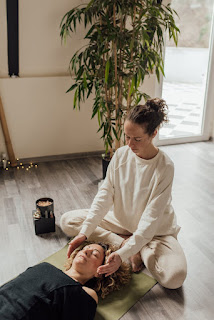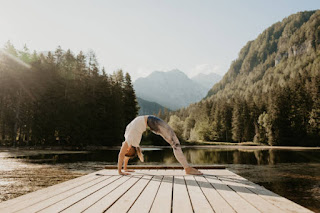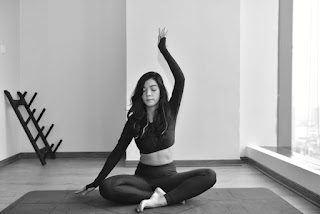From Youth to Seniority: Meditation Practices Tailored for All Ages
From Youth to Seniority: Meditation Practices Tailored for All Ages
Meditation is a journey that evolves with us through every phase of life—from the energetic mornings of childhood to the contemplative evenings of our senior years. Each stage offers unique challenges and joys, and tailored meditation techniques can provide essential support.
In this article, we explore specific meditation practices suited for various age groups. Whether you’re introducing your child to meditation, seeking stress relief as a busy young adult, or enhancing mental clarity in your golden years, there’s a tailored meditation technique just right for you. Discover how integrating meditation into daily routines can enrich every stage of life and establish a beneficial, lifelong habit. How can you adapt these practices to fit your lifestyle?
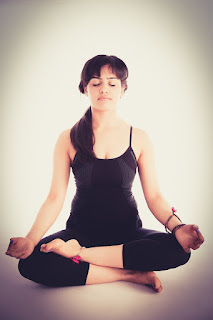
Meditation for Children and Adolescents
Introducing meditation early in life can be a game-changer for children and adolescents. In a world that is increasingly fast-paced and distracting, teaching young minds to slow down and focus has profound benefits. Meditation not only helps them manage stress but also fosters a lifelong habit of mindfulness that can support emotional and mental well-being throughout their lives.
Simple Techniques to Start With
For children, meditation should be simple and engaging. Techniques like guided imagery, where they imagine a peaceful scene (like a quiet beach or a starry sky), can be particularly effective. Another approach is the “listening game,” where children sit quietly and count how many different sounds they can hear. These methods make meditation accessible and enjoyable, turning it into a playful activity rather than a chore.
Benefits for School and Home Life
Regular meditation has been shown to improve children’s attention spans and reduce hyperactive behaviors. This can translate into better academic performance and improved social interactions. At home, parents might notice a decrease in tantrums and an increased ability to handle emotional upsets. Schools that incorporate meditation into their daily routines report fewer disciplinary issues and a more harmonious learning environment.
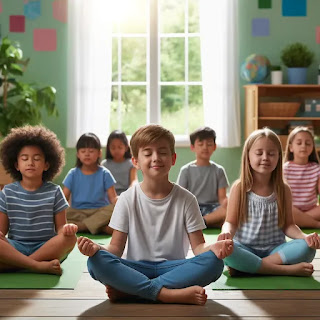
Incorporating Meditation into Daily Routines
To effectively integrate meditation into a child’s daily routine, it can be linked with regular activities such as before bedtime or after doing homework. Making it a part of the daily routine reduces resistance and enhances the likelihood that meditation becomes a habit. Parents and educators can also participate, setting a positive example and reinforcing the practice’s importance.
Meditation offers a valuable tool for children and adolescents to navigate their developmental stages with greater ease. By starting young, they build a strong foundation for emotional resilience and mental clarity that will benefit them for years to come.
Meditation for Young Adults
Young adulthood is a period filled with exploration, transition, and significant life decisions. During this stage, individuals face challenges such as career pressures, educational demands, and evolving social relationships. Meditation can be a powerful tool for young adults, helping them navigate these changes with greater mindfulness and reduced stress.
Tailored Techniques for Managing Stress
One effective meditation technique for young adults is mindfulness meditation. This practice involves paying attention to the present moment without judgment. By focusing on their breath or bodily sensations, young adults can learn to observe their thoughts and emotions without being overwhelmed by them, which is crucial in managing stress and making thoughtful decisions.

Enhancing Focus and Productivity
Another beneficial practice is concentration meditation, where the focus is on a single point, such as a breathing pattern, a mantra, or even a candle flame. This form of meditation enhances the ability to concentrate, which can be particularly useful for young adults dealing with academic or professional pressures.
Meditation for Goal Setting and Personal Development
Visualization meditation is also powerful for young adults. It involves envisioning success in various aspects of life, such as career achievements or personal goals. This practice not only motivates but also aligns the subconscious with the objectives, facilitating a clearer path toward achieving them.
Meditation for Mid-life Adults
Mid-life is a period of significant reflection and sometimes, reinvention. Adults in this life stage often juggle multiple responsibilities, including career demands, family obligations, and personal aspirations. Meditation can be a crucial tool for managing these pressures, promoting mental balance, and fostering personal growth.
Techniques for Stress Management and Balance
Mindfulness meditation remains a staple for managing stress at this life stage. It helps mid-life adults stay present and grounded, minimizing the overwhelm that can come from life’s complexities. Another beneficial practice is walking meditation, which can be integrated into daily activities like taking a break at work or walking in a park. This form of meditation combines physical activity with mindfulness, enhancing physical health while reducing stress.
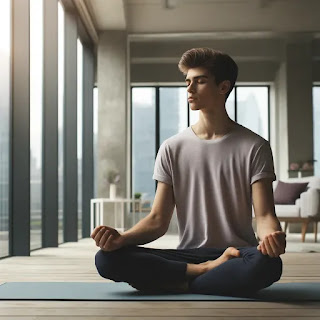
Deepening Self-Awareness and Growth
Mid-life is also a time for deeper self-reflection and evaluation. Techniques like self-inquiry meditation or “Atma Vichara” can be particularly powerful. This practice involves deep questioning into one’s nature and existence, helping individuals understand their true desires and the changes they may wish to implement in their lives.
Meditation for Emotional Regulation and Renewal
Yoga Nidra, or yogic sleep, is an excellent meditation technique for emotional regulation and rejuvenation. It involves a state of consciousness between waking and sleeping, like the “going-to-sleep” stage, which is incredibly rejuvenating for the mind and body. It’s particularly beneficial for mid-life adults, helping them to release pent-up emotions and achieve a deeper state of relaxation.
Integrating Meditation into a Busy Lifestyle
For mid-life adults, integrating meditation might seem challenging due to time constraints. However, even short sessions of 5 to 10 minutes can be profoundly beneficial. Setting aside a few minutes in the morning or evening for meditation can help maintain a daily practice without overwhelming their schedule.
Meditation during mid-life can serve as a powerful tool for navigating this transformative period. It supports emotional well-being, enhances clarity, and encourages a balanced approach to the challenges and opportunities of this life stage.
Meditation for Seniors
As we enter our senior years, meditation can play a crucial role in maintaining and enhancing mental and physical health. This life stage often brings significant changes, including retirement, changes in health, and different social dynamics. Meditation offers a way to adjust to these changes with grace and resilience.
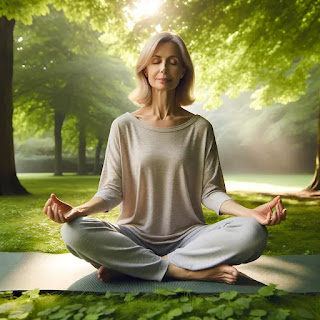
Adapting Meditation for Physical Limitations
For seniors who might face mobility issues, chair yoga and guided meditation can be ideal. These practices allow for the experience of meditation without the need for sitting on the floor or standing for long periods. Gentle movements can help maintain flexibility and circulation, while meditation can reduce feelings of isolation or depression, which are common in older age.
Cognitive Benefits
Meditation has been shown to help maintain cognitive function and can even be a supportive tool in managing symptoms of dementia and Alzheimer’s disease. Practices like Kirtan Kriya, which involves chanting and repetitive motion of the fingers, have been specifically studied for their benefits in cognitive maintenance among seniors.

Enhancing Emotional Well-being
This period of life can sometimes feel isolating or overwhelming as lifestyles and relationships transform. Meditation practices that focus on gratitude and loving-kindness can be particularly beneficial. These practices encourage positive emotions, help seniors feel connected to their communities, and cultivate a sense of peace and contentment.
Establishing Routine
Establishing a regular meditation routine can help structure daily life in retirement. Morning or evening meditation sessions provide a touchstone of routine that can help seniors navigate the day more smoothly and provide a sense of purpose and regularity.
Meditation provides seniors with tools to enhance their quality of life, maintaining mental alertness, fostering emotional well-being, and addressing the unique challenges of aging. It’s a valuable practice that supports health and happiness during the golden years.
Embracing Meditation at Every Stage of Life
Meditation is not merely a practice but a journey that accompanies us from the playful days of childhood to the reflective moments of our senior years. Each stage of life presents unique challenges and opportunities for growth, and meditation offers the tools needed to navigate these with grace and resilience.
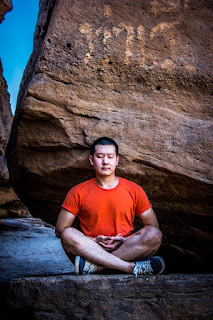
By tailoring meditation techniques to meet the specific needs of each age group, we can maximize the benefits of this powerful practice. For children, it lays the foundation of focus and emotional regulation; for young adults, it provides a means to manage stress and align with personal and professional goals; for mid-life adults, it serves as a pathway to emotional balance and personal transformation; and for seniors, it offers a way to maintain cognitive functions and enhance overall well-being.
As we have explored, integrating meditation into our daily lives is not only feasible but also immensely beneficial. It doesn’t require exhaustive periods of time; rather, it asks for consistency and a willingness to grow inwardly at every age. Whether through a few minutes of guided imagery or a session of yoga nidra, the practices we adopt can profoundly influence our quality of life, offering peace and presence in a bustling world.
We encourage everyone to consider how meditation can be adapted and embraced as a lifelong companion. It’s never too early or too late to start benefiting from its transformative power. So why not begin today? Embrace meditation as a vital part of your daily routine and watch as it enriches every facet of your life, at every stage.

Meditation for Children and Adolescents: Laying the Foundation
Introducing meditation practice early in life is crucial. Techniques such as guided meditation using imagery of a peaceful scene or the “listening game” help children enjoy meditation while gaining skills in focus and emotional regulation. Regular meditation can improve attention spans, reduce hyperactivity at school, and foster a more mindful life from a young age.
Young Adults: Navigating Changes with Mindfulness
For young adults, practicing mindfulness meditation and concentration techniques can significantly reduce stress and enhance productivity. Including meditation tips in daily routines helps young adults manage career pressures and social changes, supporting better mental health and decision-making skills.
Mid-Life Adults: Achieving Balance and Clarity
Mid-life adults benefit greatly from mindfulness and walking meditation, which can be integrated easily into daily life, even with busy schedules. Techniques like Yoga Nidra provide deep relaxation and emotional renewal, helping adults navigate challenges of balance and responsibility in their personal and professional lives.
Seniors: Maintaining Well-being and Cognitive Health
Meditation practice for seniors includes chair yoga and guided meditation suited to those with physical limitations. This stage of life benefits from practices that emphasize gratitude and compassion, enhancing emotional well-being and maintaining cognitive function, with particular attention to health benefits like improved blood pressure control.
The Role of Meditation Teachers and Tailored Techniques
Consulting with meditation teachers can provide insights into how best to adapt meditation techniques through different life stages. Whether it’s through personalized meditation tips or learning about transcendental meditation, expert guidance can tailor practices to individual needs, enhancing the journey towards a more mindful life.
Conclusion: Embracing Meditation as a Lifelong Companion
From the playful days of childhood to the reflective moments of senior years, meditation offers tools to handle life’s challenges with grace. It’s never too early or too late to begin a meditation practice that fosters a calm, focused, and balanced life.
![Top Classes in Mindfulness Online – Updated [May 2024]](https://harmonycentered.com/wp-content/uploads/2024/05/IMG_2574-1.jpeg)

